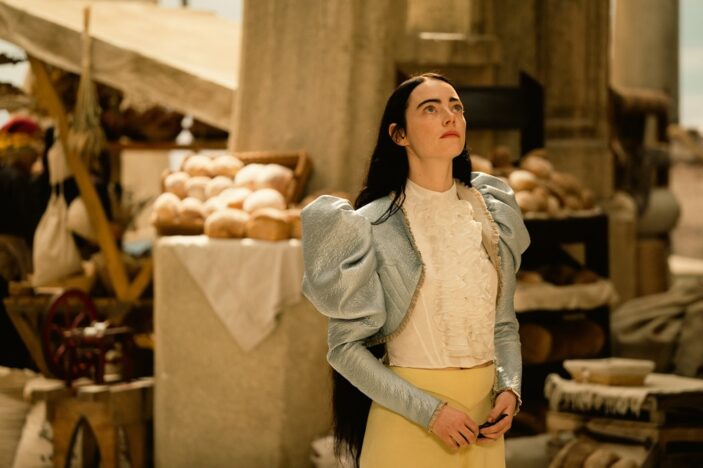
Like his previous works that celebrate their fantastical, absurdist nature with a certain gravitas, Yorgos Lanthimos grounds Poor Things, an undeniably wild, oft-offensive, sexually liberated black comedy, with a stirring sense of emotion and topical commentary.
In 19th century London – or what such a time period looks like within Lanthimos’ vivid imagination – the eccentric Dr. Godwin Baxter (Willem Dafoe), emphasis on “God”, fishes the body of a woman out of the Thames and reanimates her with an infant brain. This woman – whose unsavoury past is gradually alluded to over the course of Poor Things‘ 141 minutes – is named Bella Baxter (Emma Stone, whose second Academy Award seems all but guaranteed at this point).
The Frankenstein-like mentality present with the Doctor recreating Bella is extended throughout the Baxter household – all I’ll say is that animal heads aren’t always attached to their natural bodies – and much of the film’s first half is devoted to tracing Bella’s movements as her brain develops and she starts to walk, talk, and garner her surroundings; mostly with an unbridled glee and curiosity that Stone embodies to adorable, unhinged perfection.
As he continues with his variety of experiments and medical procedures, Baxter hires the inquisitive Max McCandless (Ramy Youssef) to continue documenting Bella’s development, leading to a romance between the two. Max being aware of Bella’s growing state means there’s a confliction over his feelings towards her, and both he and Baxter can’t necessarily contain the increasingly curious Bella from wanting to explore the outside world, something the charming, but lecherous Duncan Wedderburn (a hilarious Mark Ruffalo) can offer her.
Whilst the two initially bond over Bella’s insatiable sexual appetite (“Furious jumping”, as she likes to call it) and her somewhat submissive nature in relation to Duncan’s knowledge of the world, their European travels soon sour as she refuses to succumb to polite society’s expectations; Duncan’s insistence that “How marvellous” be one of the few phrases she restrict her vocabulary to has a typically humorous pay-off when Bella opts to use it at the inopportune time of someone talking of their father’s ill-health. As Bella starts to learn of misfortune in the world and the differing class systems, she happily gives away Duncan’s fortune, leading to her exploring her autonomy as a Parisian prostitute.
As wild as the narrative sounds – the script penned by Tony McNamara (who co-wrote Lanthimos’ The Favourite) is adapted from Alasdair Gray‘s novel of the same name – the visual representation in its actuality is even wilder, and the cartoonish nature of the surroundings is reflected in the performances; it can’t be stated enough how uproarious Ruffalo is. But as heightened as everything is, there’s a truth and an honesty to the portrayals, with Stone’s oddity always basing itself in a reality. It’s spellbinding how she throws her whole body into the embodiment of Bella, voiding her being of vanity as she projects every line of dialogue and enacts every direction with a masterful assurance.
An enormity of a movie with a deeply intimate core, Poor Things looks at our basic impulses and desires as human beings and how there’s a beauty in the honesty as to how we view the world we actually live in; a world, as Lanthimos likes to remind us, that’s dirty, tragic, and gloriously twisted.
![]()
![]()
![]()
![]()
![]()
FIVE STARS (OUT OF FIVE)
Poor Things is screening in Australian theatres from Boxing Day, December 26th, 2023.
Poor Things was originally reviewed as part of our 2023 Brisbane International Film Festival coverage.
